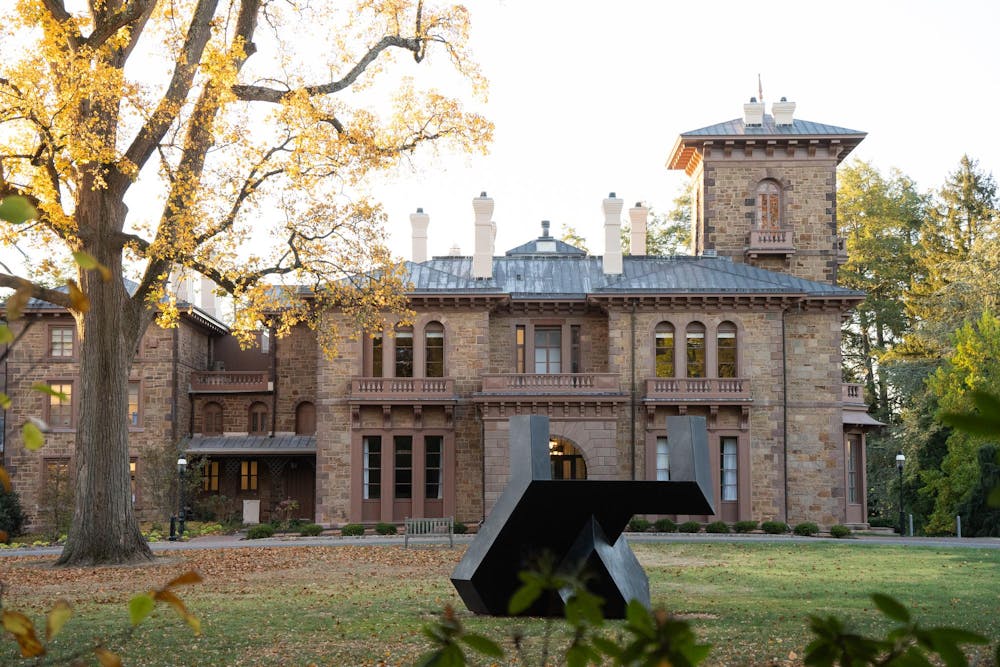Amid a flurry of new construction on campus, the Princeton Birding Society (PBS) is working with several University offices to ensure that both new and existing buildings have bird-safe glass. At Princeton, about 136 birds die per year, according to PBS member Joseph Uglialoro ’27.
“We have a lot of collisions happening when migratory birds are first arriving on the Princeton campus,” he said.
Uglialoro is a staff Sports writer for The Daily Princetonian.
With funding from the Council on Science and Technology (CST) and the Office of Sustainability within Princeton Facilities, PBS identified the Frick Chemistry Laboratory, the Andlinger Center for Energy and the Environment, the School of Architecture building, and Yeh and New College West residential colleges as high-risk areas for birds. Plans are underway to add bird-safe film to these buildings within the next few years.
In an interview with the ‘Prince,’ Professor of Ecology & Evolutionary Biology and leader of the Princeton Better for Birds Project (PBBP) Mary Stoddard explained that the bird-safe film contains “a two-inch by two-inch grid” design, which helps birds see that the glass is solid.
The grid “is actually extremely effective, because birds no longer see it as a continuous thing that they can fly through,” she continued.
“What’s so nice about these dots is that they don’t affect, in a negative way, the humans’ experience. You can still have your window,” she added.
PBBP has also worked with the Office of Capital Planning to ensure that all new construction on campus has bird-safe glass. Assistant Director of Sustainability Ijeoma Nwagwu told the ‘Prince’ that she is looking forward to the new glass.

“The policy move has happened, meaning this is now incorporated into the design standard manual,” she said.
According to Nwagwu, the PBBP’s partnerships with so many campus entities was an extremely fateful encounter.
“I was at a meeting and sharing about the monitoring, and then I was sitting right next to the Executive Director for the Council [on Science and Technology],” she said. “We got talking and found that we were all on different sides of the same project. We started to coordinate together and have been on it since.”
Stoddard explained that while the bird population has decreased by three billion in the past 50 years, it is essential to protect them because of their role in the ecosystem.

“Hummingbirds pollinate wildflowers. Wildflowers provide nectar reward, so the hummingbirds get the nectar, and the hummingbirds are providing the pollination service,” she said.
Stoddard also explained that birds play a role in indicating climate change.
“If the flowers are blooming in a way that’s out of sync with the hummingbirds, the flowers will be in bad shape, and the hummingbirds will be in bad shape — both parties will suffer.”
PBS was founded by Claire Wayner ’22 and Joseph Kawalec ’21 in 2018 to address avian concerns on campus. They began monitoring campus for bird collisions, specifically at the Prospect Garden Room, a dining room in Prospect House that has glass walls.
With support from Stoddard, Wayner received funding to launch PBBP and continue their collision-monitoring efforts. Bird-safe film was added to the Garden Room in Spring 2022.
Since the application of the bird-safe film, there have been no reported collisions with the Prospect Garden Room.
“It’s exciting to see all these groups come together,” Assistant Director of CST Craig Marshall told the ‘Prince’ in an interview. “It’s Cassie [Stoddard] and the undergraduates on the Princeton Birding Society that are really getting people to care about this work,” he added.
“Getting this bird-safe glass up is going to be so huge, and I’m so excited to see that, and excited to see the decrease in collisions that we’re expecting to see,” Uglialoro told the ‘Prince.’
“I’m also just excited mostly how this project is going to influence the people on campus and hopefully create a campus that’s more conscious of birds, more conscious of sustainability, and that’s willing to come together and see just how cool birds can be,” he added.
“This matters. This matters to faculty. This matters to our community — and the undergrads were successful,” Stoddard said.
“Birds really speak to our inner interest in connecting with the natural world,” she added. “I’ve been so encouraged and excited by the energy of students on this campus, the passion I’ve seen among birders, but also people who may not consider themselves birders.”
“We know we’re part of the problem, but I think we can be part of the solution here too.”
Luke Grippo is a News contributor for the ‘Prince.’
Please send corrections to corrections[at]dailyprincetonian.com.








